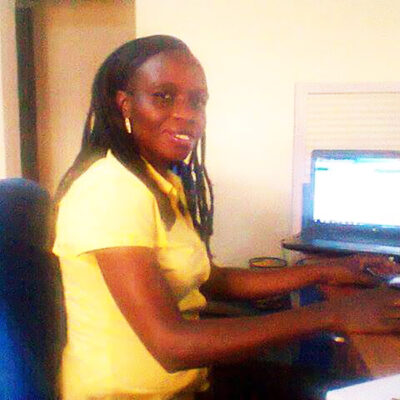Our first decade at a glance
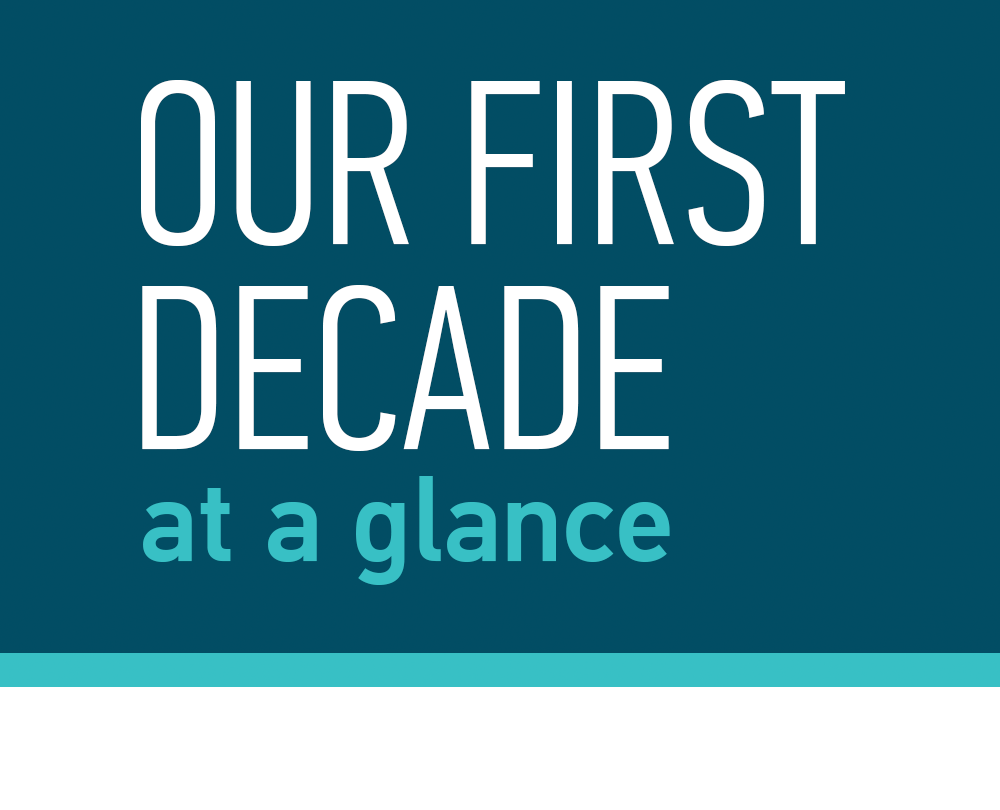
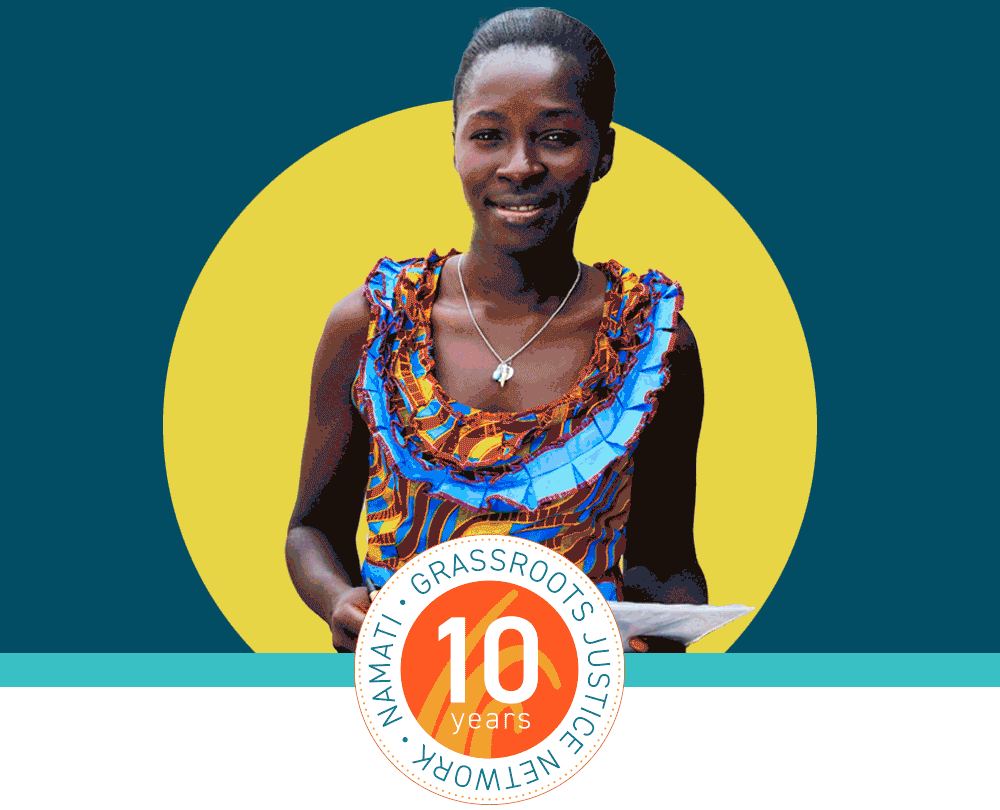

SHARE:
In 2012, Namati and the Grassroots Justice Network started with a vision. A vision of a global movement of people who advance social and environmental justice by knowing, using, and shaping the law. Over the past decade, that vision has become a reality.
In the six countries where Namati and partners work, paralegals and communities achieved concrete remedies to thousands of injustices, directly improving the lives and wellbeing of over 1.5 million people.
Families from discriminated minority groups have obtained critical ID documents for the first time. Communities overburdened by pollution have persuaded factories and mines to comply with environmental regulations. Forest dwellers have protected hundreds of thousands of acres of rainforest from unlawful destruction. Patients have prevailed upon their health facilities to install running water and provide private exam rooms to ensure dignified care.
Building on this grassroots experience, movements in each of those countries have envisioned, demanded, and won dozens of systemic changes, including, in Sierra Leone, one of the world’s most progressive laws on land and environmental justice; in Myanmar, legal recognition of the customary land rights of ethnic minorities; and in Mozambique, a nationwide-system for ensuring community participation in the governance of healthcare.
The Grassroots Justice Network (formerly Legal Empowerment Network), which Namati co-founded and convenes, has grown from fewer than 50 people in one room to become the largest community of justice defenders in the world. Today, our 12,300+ members come from over 3,430 organizations across 175 countries. By learning from each other and building power across our borders, we are working to bring justice everywhere.
You can read about some of our major achievements in this report, and hear directly from a few of the inspiring people leading the movement for grassroots justice.
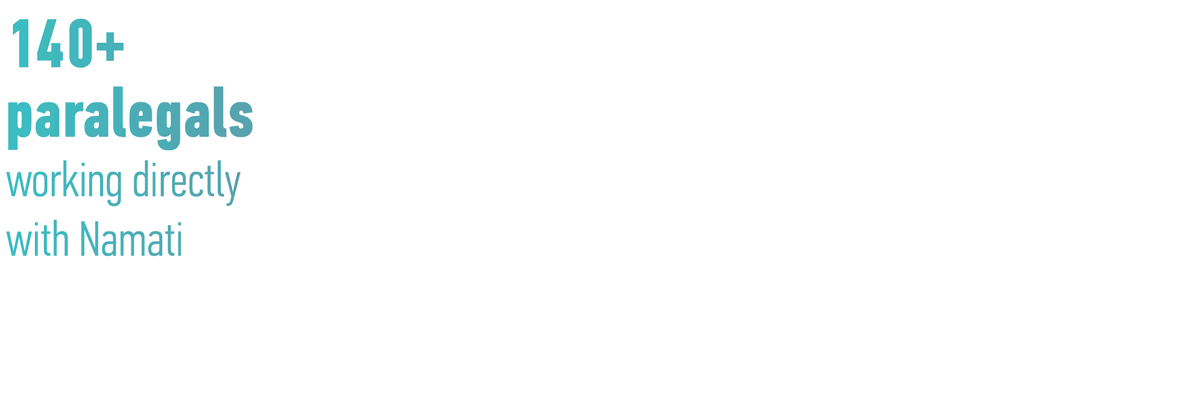

People Rising: Beside the Water tells the story of how Mrs. Jalloh and others combined the power of law with the power of organizing to stop the destruction of 75,000 acres of rainforest.
People Rising for Justice in Sierra Leone
In Sierra Leone, paralegals and communities working with Namati have taken on over 300 land and environmental injustices in the last decade, including unfair lease agreements, unlawful pollution, and heedless destruction by mining companies and agribusiness. Connecting across those specific struggles, paralegals and communities envisioned, fought for, and won two of the most progressive laws on land, climate, and environmental justice in the world. Among other things, the new laws enacted in 2022 grant every community the right to free, prior, and informed consent over any development on their land; ban industrial development in old-growth forests; and empower local land use committees which must be at least 30% women.

 
Aisha Khagai, of Namati Kenya, shares her experience fighting for citizenship justice, including for her 5-year old son Abdil.
Fighting to End Discrimination in Kenya
Roughly five million Kenyans face a discriminatory process when applying for identity documents due to their ethnicity or religion. Without an ID, they cannot apply for a job, receive a bank loan, or access healthcare. Since 2013, over 27,500 people have been supported to apply for documentation with the help of a paralegal.
Together with impacted communities, we are leading a nationwide movement for equality in access to IDs. In 2021, under pressure from the growing movement, the Kenyan parliament formally recommended, for the first time, that all processes for Muslim Kenyans to obtain citizenship documentation be transparent and non-discriminatory.
“The people of Myanmar have little choice but to adapt to the changing rules and systems, even as they protest them. Namati is adapting alongside them.”
Land and Environmental Justice in Myanmar
Over 50 years of dictatorship, the Myanmar military and its affiliated businesses have unjustly acquired millions of acres of land from farmers and ethnic minorities. Prior to the coup in 2021, community paralegals supported over 13,000 people across 8 regions to navigate complex administrative processes to register, regain access to, and better protect the land they use. Uniting across their specific cases, paralegals and communities advocated for and won, 5 major improvements to laws and systems. These included provisions in Myanmar’s 2016 National Land Use Policy which permitted joint land registration between men and women and acknowledged, for the first time, the customary land rights of ethnic minorities.
On February 1, 2021 the military junta seized power, abruptly reversing over a decade of democratic progress. The people of Myanmar have little choice but to adapt to the changing rules and systems, even as they protest them. Namati is adapting alongside them.

People Rising: Ivy City follows Sebrena Rhodes, Ivy City resident and community organizer, as she and partners combine the power of law with the power of organizing in the active fight to close a harmful chemical facility located in her neighborhood.
Advancing Environmental and Economic Justice in the US
In the mid-Atlantic region of the US, communities face the interlocking crises of toxic pollution; inequitable access to public transportation and housing; and lack of job opportunities. While communities of color and low-wealth neighborhoods bear the brunt of this injustice, they have not had much of a say in discussions about legislative and policy solutions. To change that, Namati equips organizers and communities to use law and science to build healthier communities, and convenes the MidAtlantic Justice Coalition. In 2022, in response to advocacy by the coalition, Maryland made a historic commitment to direct at least 40% of spending on climate change and green infrastructure to the communities who need it the most.

In 2016, Kenya adopted the Community Land Act, making it possible for communities to secure a legal deed to their land. When the government neglected to implement the law, communities took action.
Community Land Protection in Kenya
Rural communities in Kenya have been denied the legal right to manage their land and resources for generations. They live with a constant and growing risk of their land being grabbed by companies or the government. Namati and our partners support Indigenous pastoralist communities to use the groundbreaking Community Land Act to protect their land and to advocate for changes if it is not working as intended. To date, 40 communities – representing over 110,000 people and over 345,000 acres of land– have pursued legal registration of their lands with the help of paralegals. In 2019, representatives of those communities marched to the Ministry of Lands and secured government commitment to deploy necessary personnel to implement the law at scale. Matito Leriso was among them. Read how Matito and others have worked to understand, use and shape the new law to ensure that their community land rights are upheld.
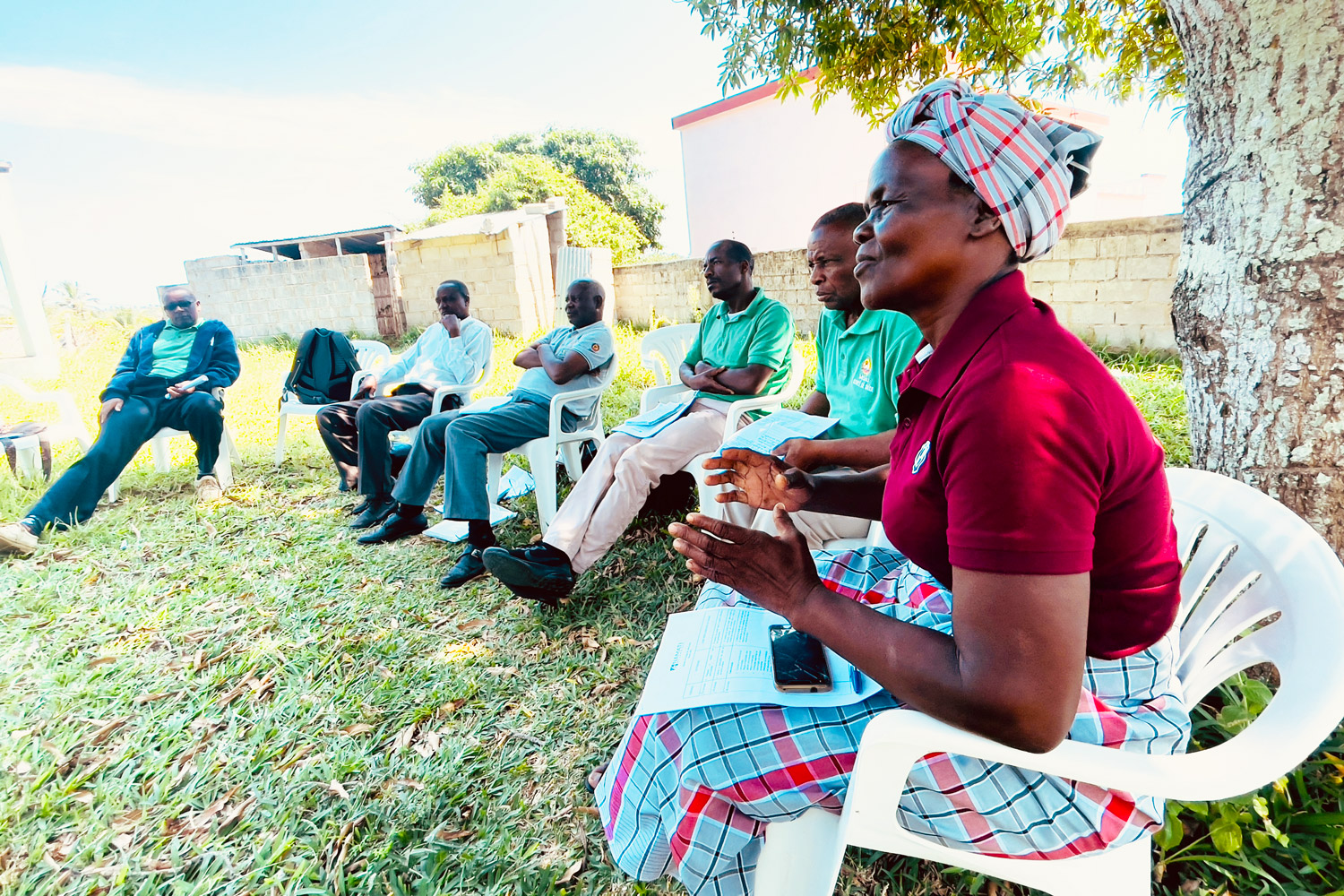
Village health committee members meeting with Namati health advocate, Cézar Malate, to discuss strategies for addressing mistreatment in the maternity ward.
Healthcare with Dignity in Mozambique
Mozambique, like many other countries today, has progressive healthcare policies. But there are massive breakdowns in delivery: in many facilities, patients are treated disrespectfully, essential drugs are missing, or there is no privacy during medical visits. When these experiences accumulate, people lose faith in the health system and many opt to stay away, forgoing critical care. Community paralegals — known locally as defensores de saúde (health advocates) — work with village health committees, health workers, and patients to address violations when they occur. Over the course of the past decade, Namati has worked alongside communities to identify over 29,000 grievances related to health service delivery – 81% of which have been resolved. In 2021 Namati, together with the health leadership of one of Mozambique’s 11 provinces, launched a joint initiative aimed at ensuring that all 144 health facilities offer privacy and dignity to patients. Read here about the impact over the course of just 18 months.

This short video highlights the wins that the JFA campaign achieved for the movement for grassroots justice.
SDG 16: Putting Justice at the Center of Development
When the United Nations launched the Millennium Development Goals in 2000, it left out justice altogether. As world leaders began to discuss a new set of goals, hundreds of Grassroots Justice Network members argued that justice is critical to sustainable development. Our collective advocacy was instrumental in securing the inclusion of access to justice – what is known as Goal 16 – in the 2030 Agenda for Sustainable Development. On the heels of that win, the Network launched the Justice For All (JFA) campaign to turn the groundbreaking commitment into results. The campaign made a case for greater investment in legal empowerment by contributing to key research efforts like the Justice For All report. By 2020, the campaign secured laws and policy commitments in 14 countries that recognize or fund grassroots justice defenders.
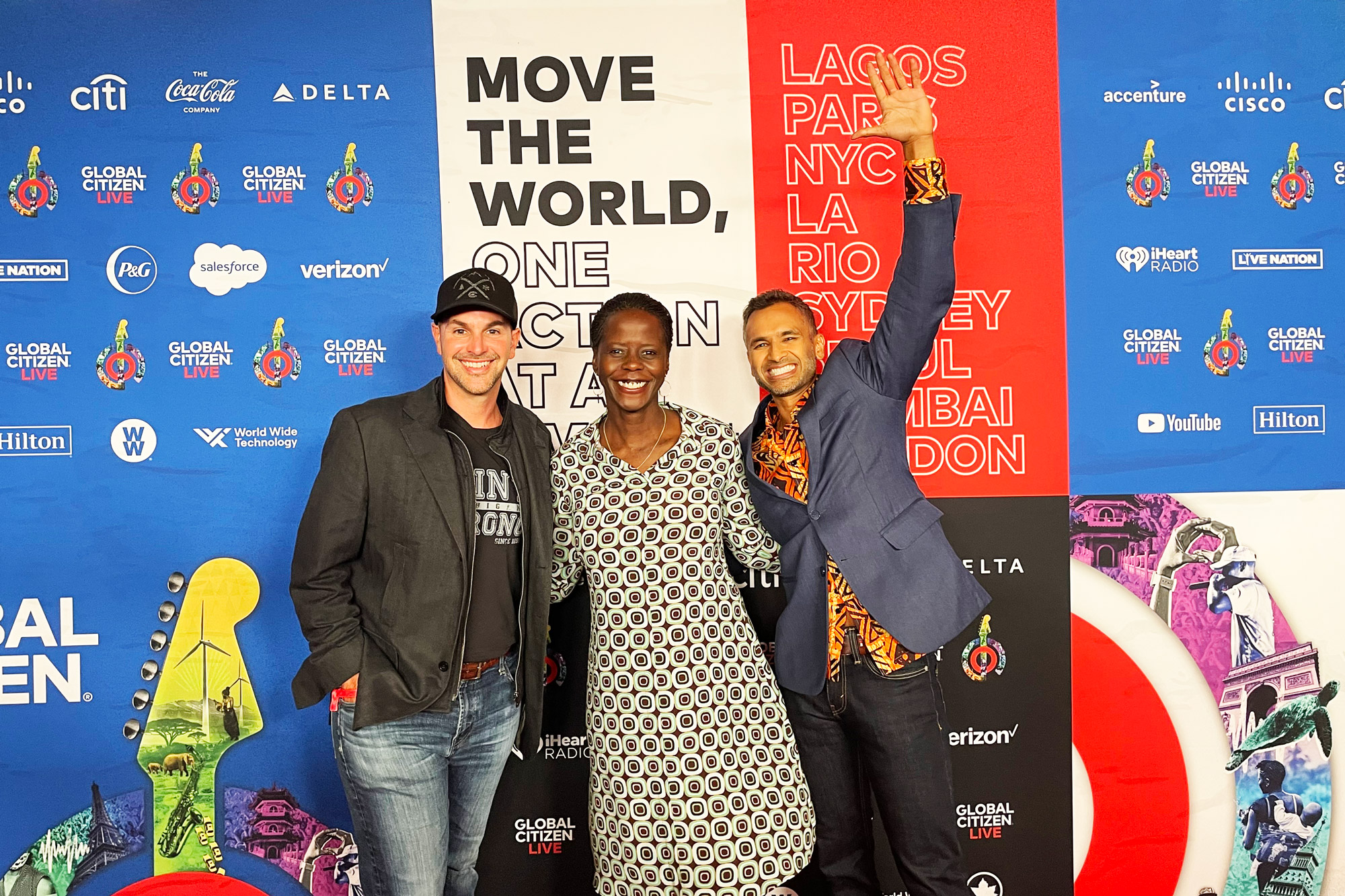
Vivek Maru (Namati), Atieno Odhiambo (FGHR), and Ridgeway White (Charles Stewart Mott Foundation) announce the Legal Empowerment Fund at Global Citizen Live in New York, 2021. Photo credit: Global Citizen
Financing the Global Movement
Over 8,000 people and 180 organizations took part in the Justice For All campaign. Together we demanded increased financing and protection for grassroots justice. In response to our collective action, the first ever multi-million dollar, multi-donor fund for legal empowerment was launched in 2021. The Legal Empowerment Fund (LEF), now led by the Fund for Global Human Rights, provides core funding to grassroots activists and organizations worldwide.
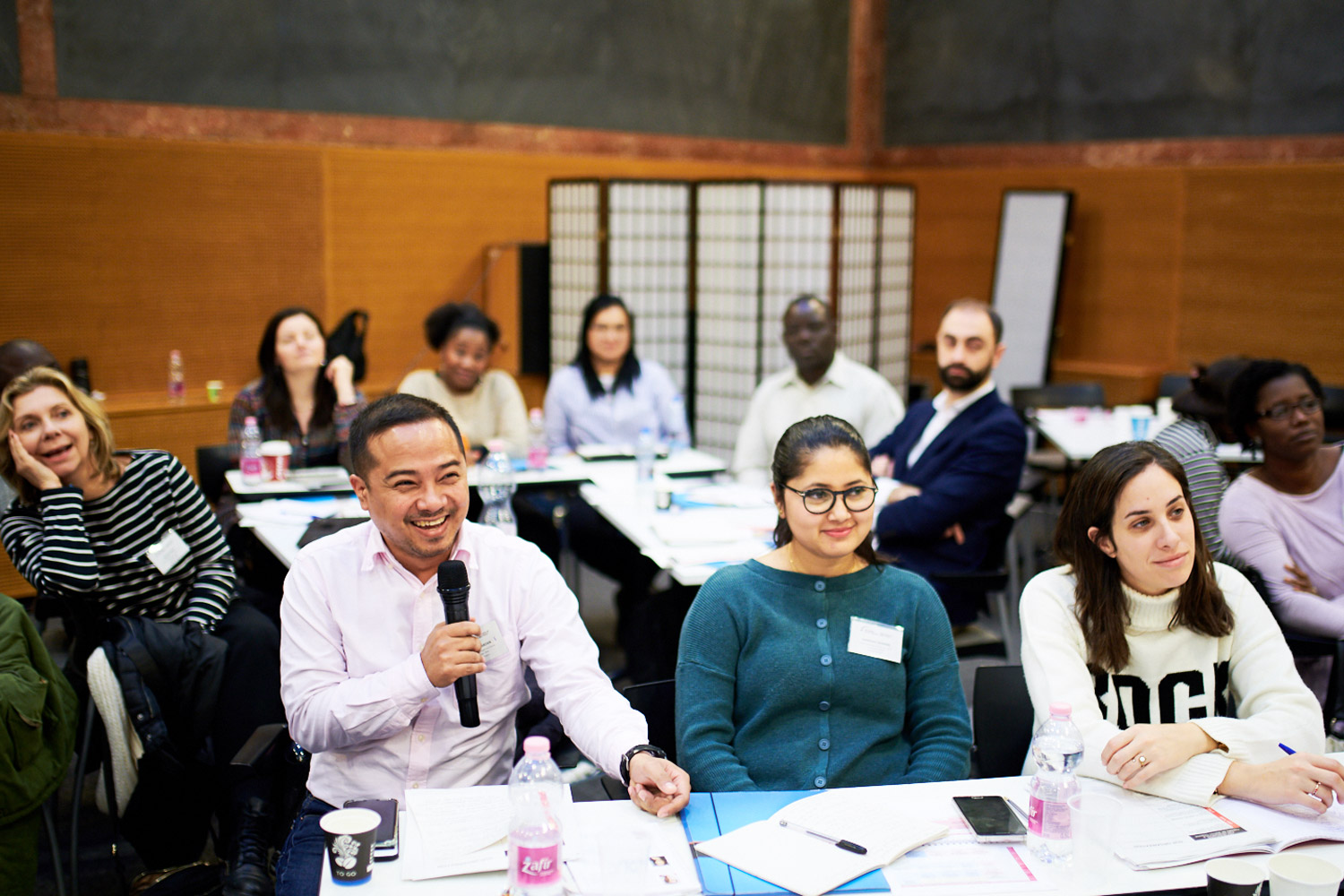
In 2018, members of the Grassroots Justice Network convened at Budapest’s Central European University for the fourth annual Legal Empowerment Leadership Course. Photo credit: Daniel Vegel
Global Solidarity and Learning
The Grassroots Justice Network members come together from across 175 countries to connect, learn, and act. In our first decade, more than 5,000 Network members participated in our flagship annual Legal Empowerment Leadership Course, international learning exchanges, and virtual learning opportunities. And we built the world’s most comprehensive resource library on legal empowerment, with over 70,000 downloads to date. Through peer-to-peer learning and guided reflection, members gained the skills and confidence necessary to implement new ideas and expand existing programs. Engagement with the Network inspired member organization FIMA in Chile, for example, to transform its litigation department so as to focus on building community power. Another member, Alaska Legal Services, hatched a plan at our Leadership Course for what became a statewide initiative combining medical and legal outreach to Indigenous communities. Altogether, between 2018 and 2022, over 280 organizations in the Grassroots Justice Network significantly improved their impact as a result of learning we curated.
Tens of thousands of paralegals are working with Network member organizations. In the coming years, the Network will continue to expand and deepen learning opportunities to serve these frontline justice defenders.
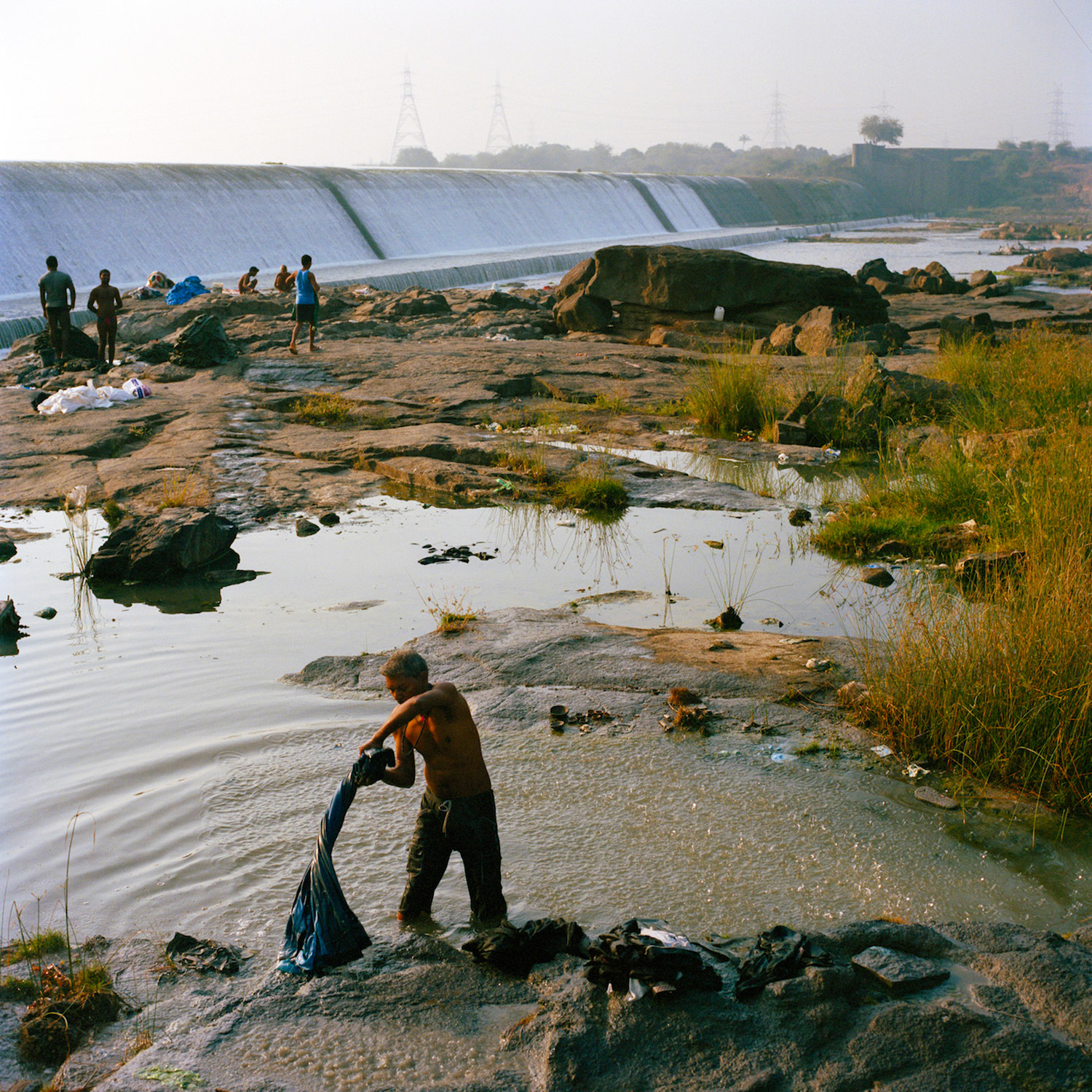
A man launders clothes in water running over the Madhuban dam located on the Daman river, near Vapi, Gujurat. Photo credit: Aubrey Wade
Environmental Research in India
Between 2012 and 2021, Namati partnered with the Centre for Policy Research to study the dynamics between written environmental regulations and actual implementation of these regulations. This was aimed at understanding the capacity for enforcement and the underlying political economy of environmental regulation in India. CPR researchers worked in four states to identify how communities affected by non-compliance were engaging with the regulatory framework. The research explored if and how greater community engagement with administrative and regulatory institutions at the local and state level could improve environmental compliance and reduce environmental impacts.
“The four entities that constitute Namati attained a total of 33 clean audits – over US$80 million in spending.”
Stewarding US$80+ Million
Namati started its operations in 2012 with three funders and an annual budget of US$2 million. In the decade that followed, we grew our budget by an average of 18% each year. By 2022, we were working with US$13.5 million and 40 funding partners. During this ten-year period, the four entities that constitute Namati attained a total of 33 clean audits – over US$80 million in spending.
We take great care in choosing mission-aligned funders. Our supporters often remain with us for the long haul. We are particularly proud that two longtime funding partners, the Charles Stewart Mott Foundation and the Hewlett Foundation, went on to found the Legal Empowerment Fund, with an aim to mobilize US$100M across ten years for the entire field of legal empowerment. Namati committed US$5 million to the fund, thanks to a gift we received from philanthropist Mackenzie Scott.

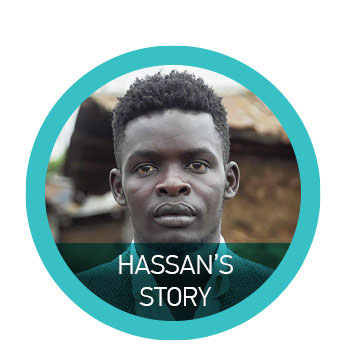
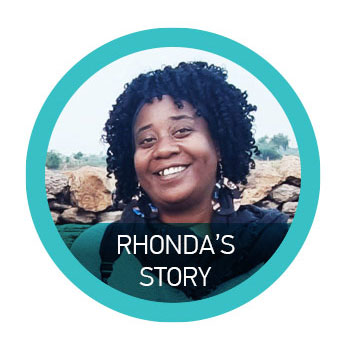
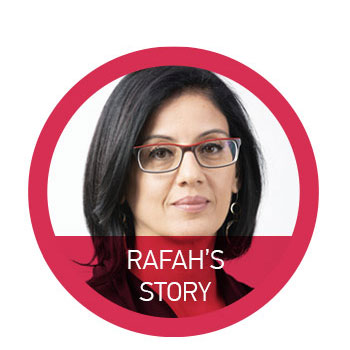
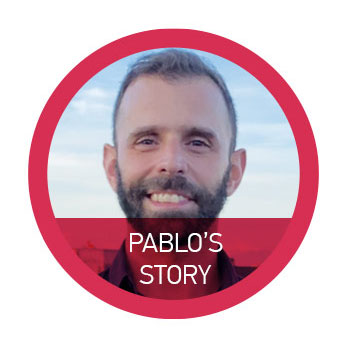

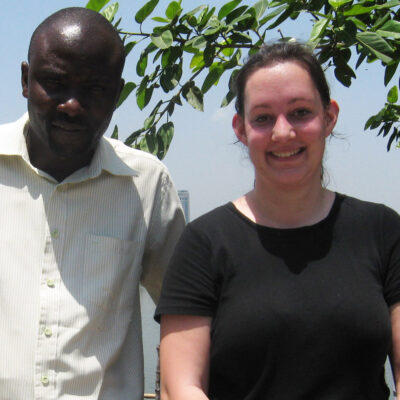
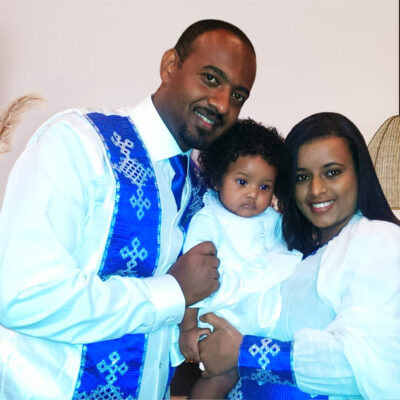
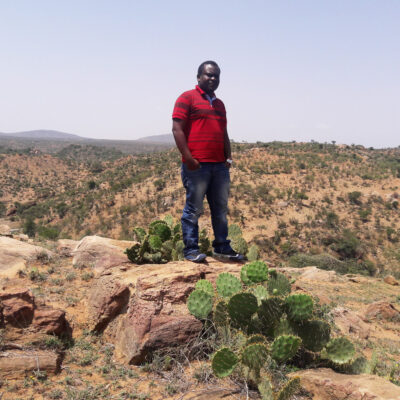
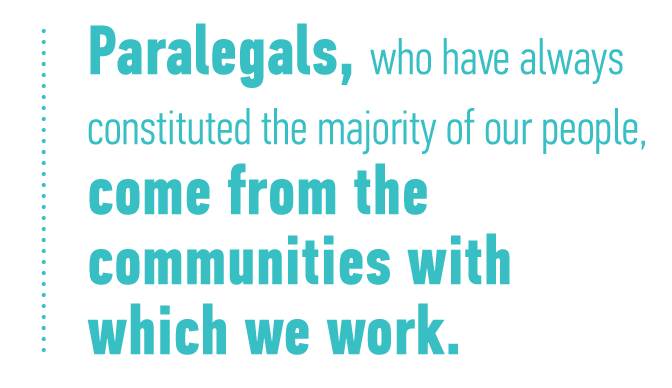 In Namati’s first ten years, we developed multi-year collaborations with 17 local implementing partners across eight countries. One of the core lessons we learned is that the more embedded we are in the local context, the more impact we make. That is why, in 2018, we committed to a long-term presence in six countries.
In Namati’s first ten years, we developed multi-year collaborations with 17 local implementing partners across eight countries. One of the core lessons we learned is that the more embedded we are in the local context, the more impact we make. That is why, in 2018, we committed to a long-term presence in six countries.
